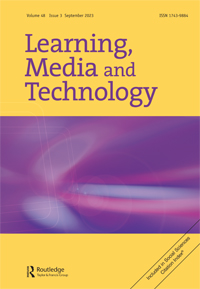网络教师身份与合法性在英语教学中的话语建构
IF 3.1
1区 教育学
Q1 EDUCATION & EDUCATIONAL RESEARCH
引用次数: 0
摘要
摘要本文考察了主流语言意识形态下YouTube教师的身份建构。基于语言教师职业认同、社交媒体微名人人格、语言创业、种族语言意识形态和网络人格等概念,本研究分析了网络教师的横幅图像、传记和半结构化访谈,为理解网络教师身份提供了一个框架。研究结果表明,在线教师策略性地与不同的身份立场保持一致或保持距离,以突出他们作为在线英语教师的身份。研究结果指出,在新自由主义和种族语言意识形态主导的在线英语教学(ELT)市场中,在线教师在复杂的地形中导航时,他们的身份结构很复杂。这项研究有助于更好地理解技术在促进或挑战这种意识形态方面所提供的机会,并呼吁承认在线教师为突出其教师身份所做的身份工作。关键词:网络教师身份网络教学视频多模态语言意识形态披露声明作者未发现潜在利益冲突注1一位颇受欢迎的在线英语老师因其在线教学频道https://www.bbc.com/news/av/uk-england-beds-bucks-herts-39672663.2的成功而接受了BBC新闻的采访,尽管这种分类在文献中受到了批评,但它仍然在解释英语在全球的传播和发展方面发挥了重要作用。为了清楚起见,本文仍然使用与该模型相关的术语近年来,在线英语教学专业人员越来越意识到与母语主义相关的种族语言意识形态。有一件事对这个行业的影响尤其大,导致YouTube上最受欢迎的在线教师之一发布了一段道歉视频,为她在视频中持续存在的“口音歧视”道歉。在道歉视频中,这位老师呼吁业界意识到制作可能延续种族语言意识形态的视频所带来的意想不到的后果。本文所描述的工作得到了中国香港特别行政区研究资助局的资助(项目编号:21610321)。本文章由计算机程序翻译,如有差异,请以英文原文为准。
Discursive construction of online teacher identity and legitimacy in English language teaching
ABSTRACTThe paper investigates YouTube teachers’ identity construction within dominant language ideologies. Drawing on the constructs of language teacher professional identity, social media micro-celebrity persona, linguistic entrepreneurship, and raciolinguistic ideologies and online persona, the study analyses banner images, biographies, and semi-structured interviews of online teachers and provides a framework for understanding online teacher identity. The findings reveal that online teachers strategically align or distance themselves from different identity positions to foreground their identity as online English teachers. The findings point to the complex identity construction of online teachers as they navigate the complex terrain of the online English language teaching (ELT) marketplace dominated by neoliberal and raciolinguistic ideologies. The study contributes to a better understanding of the opportunities offered by technology in promoting or challenging such ideologies and calls for a recognition of the identity work online teachers put in to foreground their teacher identity.KEYWORDS: Online teacher identityonline teaching videosmultimodalitylanguage ideologies Disclosure statementNo potential conflict of interest was reported by the author.Notes1 A popular online English teacher was interviewed by BBC News for the success of her online teaching channel: https://www.bbc.com/news/av/uk-england-beds-bucks-herts-39672663.2 While this classification has been critiqued in the literature, it still plays an influential role in accounting for the spread and development of English globally. The terminologies associated with this model are still used in this article for clarity.3 In recent years, there is a greater awareness of the raciolinguistic ideologies associated with native-speakerism among online ELT professionals. One specific incident has been particularly impactful to the industry, which led to one of the most popular online teachers on YouTube publishing an apology video for perpetuating ‘accent discrimination’ in her videos. In the apology video, the teacher appeals for the industry to be aware of the unintended consequences of creating videos which may perpetuate raciolinguistic ideologies.Additional informationFundingThe work described in this paper was fully supported by a grant from the Research Grants Council of the Hong Kong Special Administrative Region, China (Project No: 21610321).
求助全文
通过发布文献求助,成功后即可免费获取论文全文。
去求助
来源期刊

Learning Media and Technology
EDUCATION & EDUCATIONAL RESEARCH-
CiteScore
11.40
自引率
14.50%
发文量
53
期刊介绍:
Learning, Media and Technology aims to stimulate debate on digital media, digital technology and digital cultures in education. The journal seeks to include submissions that take a critical approach towards all aspects of education and learning, digital media and digital technology - primarily from the perspective of the social sciences, humanities and arts. The journal has a long heritage in the areas of media education, media and cultural studies, film and television, communications studies, design studies and general education studies. As such, Learning, Media and Technology is not a generic ‘Ed Tech’ journal. We are not looking to publish context-free studies of individual technologies in individual institutional settings, ‘how-to’ guides for the practical use of technologies in the classroom, or speculation on the future potential of technology in education. Instead we invite submissions which build on contemporary debates such as: -The ways in which digital media interact with learning environments, educational institutions and educational cultures -The changing nature of knowledge, learning and pedagogy in the digital age -Digital media production, consumption and creativity in educational contexts -How digital media are shaping (and being shaped by) educational practices in local, national and global contexts -The social, cultural, economic and political nature of educational media and technology -The ways in which digital media in education interact with issues of democracy and equity, social justice and public good. Learning, Media and Technology analyses such questions from a global, interdisciplinary perspective in contributions of the very highest quality from scholars and practitioners in the social sciences, communication and media studies, cultural studies, philosophy, history as well as in the information and computer sciences.
 求助内容:
求助内容: 应助结果提醒方式:
应助结果提醒方式:


